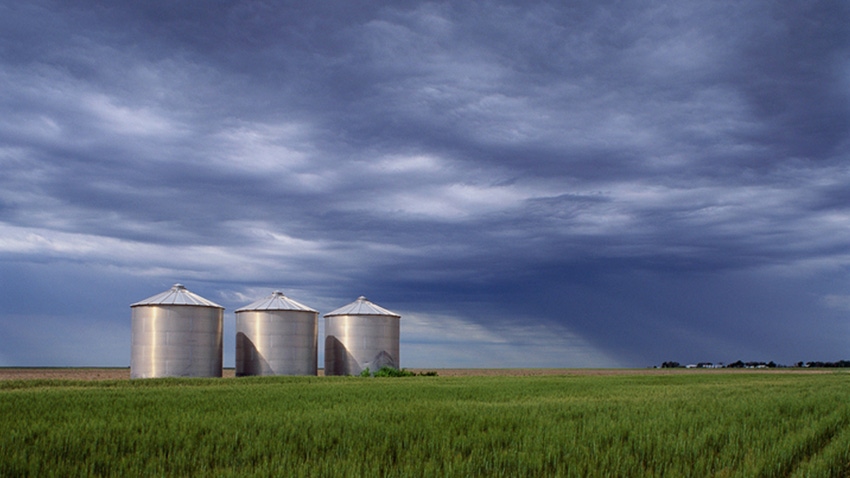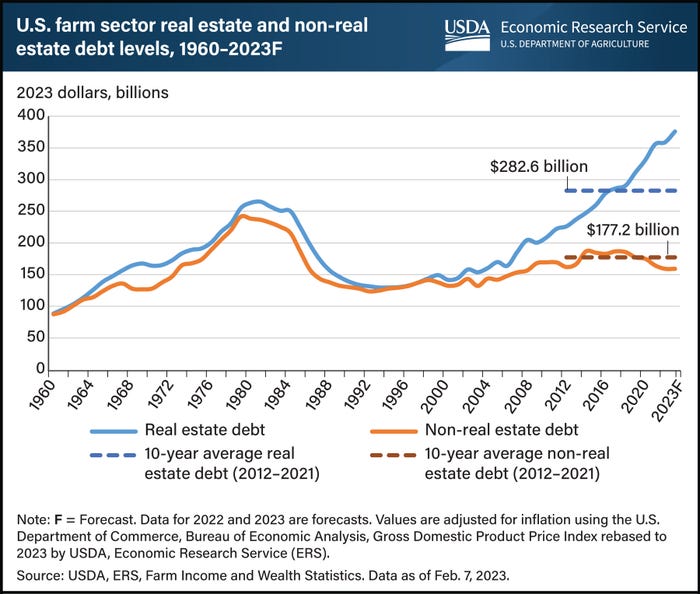
Farm-sector debt tied to real estate is expected to be at a record $375.9 billion in 2023, according to data from the USDA, Economic Research Service (ERS).
Farm-sector real estate debt has been increasing continuously since 2009 and is expected to reach an amount that is 87.5% higher in 2023, compared with 2009 in inflation-adjusted dollars. Real estate debt now far outpaces debt that is not secured by a mortgage (non-real estate debt). Historically, real estate debt and non-real estate debt have trended similarly, but they have diverged in recent years.
Non-real estate debt showed an 11.9% year-to-year increase in 2014 in inflation-adjusted dollars but has declined since 2017. Meanwhile, there has been a continuous increase in real estate debt since 2009. Growth in farm real estate asset values and relatively low interest rates contributed to the increase in farm real estate debt.

RECORD DEBT: Farm-sector debt tied to real estate is expected to be at a record $375.9 billion in 2023, according to data from the USDA Economic Research Service.
In 2023, real estate debt is expected to be 33% higher than the 10-year average (2012–21), while non-real estate debt is expected to be 10.2 % lower than the 10-year average.
According to the USDA, National Agricultural Statistics Service’s Land Value 2022 Summary, the average value of farm real estate reached a record $3,800 per acre in 2022, a 12.4% increase from 2021. Find information and analysis on ERS’s Farm Sector Income & Finances topic page, which is updated four times a year.
Logan County. The 2,490-acre Cranston Ranch in Logan County, northwest of Winona, Kan., sold April 18. This contiguous grass ranch has excellent buffalo and other native grasses along with a two-horsepower submersible water well that feeds a pipeline that goes to 13 permanent stock tanks plus several others at the corrals and other wells. There are 9 miles of near-new 5-wire fence and 4½ miles of 4-wire fence. The corral has six pens with tubs and a working alley near the center of the ranch. It is 2 miles off the Brewster blacktop and 10½ miles from Highway 40.It sold for $1,400 per acre. The seller was Donald L. Cranston. Farm & Ranch Realty Inc., Colby, Kan., handled the sale.
Rawlins County. About 1,370 acres of cropland, grass and a farmstead in Rawlins County, north of Atwood, Kan., sold at auction April 11. Tract 1 was all cropland-contiguous and east of Tract 2, and it sold for $2,900 per acre. Included in Tract 2 was the improvement site and all of the contiguous grassland south of the house, and it sold for $1,900 per acre. The water is supplied by water wells at the house. Tract 3 was 480 acres, consisting of 246 acres of cropland and 238 acres of pasture independent of Tracts 1 and 2, and it also sold for $1,900 per acre. Tracts 4 and 5 were a mixture of cropland and grass on Road 22. Tract 4 sold for $2,700 per acre, and Tract 5 sold for $1,300 per acre. There are windmills on Tracts 2, 4 and 5, and a well at the house. The seller was Casten Farm. Farm & Ranch Realty Inc. handled the sale.
Rawlins County. A quarter-section of Rawlins County cropland sold at auction March 31. This cropland is west of Oberlin, Kan., and nearly level, with a few terraces. It is open and ready for spring planting. It included an idle oil well and tank battery; all mineral rights and production went to the buyer. It sold for $3,500 per acre. Sellers were the Hammerschmidt family. Farm & Ranch Realty Inc. handled the sale.
Ford County. A near-level quarter-section of cropland in Ford County, north of Bucklin, Kan., sold at auction March 28. Located on Highway 400 with easy access to markets, about 81.36 acres were planted to wheat, with the buyer receiving the landlord’s one-third share of the crop and 100% of the mineral rights. Sellers were Kurt Kinsinger and Andrea Soucie. Farm & Ranch Realty Inc. handled the sale.
Rush, Stafford and Kiowa counties. The Long Family Partnership sold 880 acres of Rush, Stafford and Kiowa County Conservation Reserve Program grass and cropland, along with mineral rights and royalty production, at auction March 15. The land sold in five tracts. Tract 1, 240 acres of CRP in Rush County, sold for $1,600 per acre. Tract 2, 80 acres of CRP in Rush County, sold for $2,250 per acre. Tracts 3 and 4, both in Stafford County, also included seller’s interest in oil production. Tract 3, 240 acres of grassland, sold for $2,150 per acre. Tract 4, 160 acres of cropland, sold for $2,650 per acre. Tract 5, 160 acres of grassland and CRP in Kiowa County sold for $1,500 per acre. Farm & Ranch Realty Inc. handled the sale.
Scott, Finney, Ford and Stevens counties. The Long Family Partnership also sold 1,700 acres of cropland, grass and CRP in Scott, Finney, Ford and Stevens counties at auction March 16. Tracts 1, 2 and 3, in Scott County, consisted of 160 acres of cropland, 95 acres of cropland and 320 acres of cropland. Tract 1 sold for $4,100 per acre and included oil and gas production. Tract 2 sold for $2,700 per acre. Tract 3 sold for $4,000 per acre and also included oil and gas production. Tracts 4 and 5 were in Finney County and were each 320 acres of cropland. Tract 4 sold for $3,000 per acre, and Tract 5 sold for $3,100 per acre. Tract 6, in Ford County, was 155 acres of cropland and sold for $3,500 per acre. Tract 7, in Stevens County, also included oil and gas production and sold for $1,350. Farm & Ranch Realty Inc. handled the sale.
Baca County, Colo. About 620 acres of Baca County, Colo., dryland was sold in one tract at auction April 25. The perfect-square section of cropland just 3 miles north of Springfield on Highway 287 had been well-farmed and cared for. All of the seller’s share of the mineral rights transferred to the buyer. The land sold for $865 per acre. The seller was Mina Peterson. Farm & Ranch Realty Inc. handled the sale.
The USDA Economic Research Service contributed to this article.
About the Author(s)
You May Also Like






